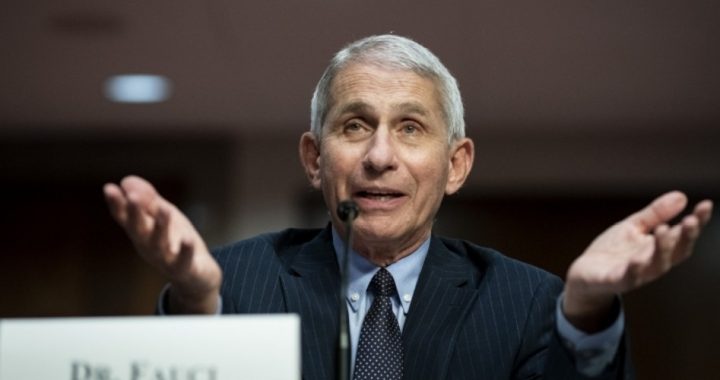
Dr. Anthony Fauci recently said he opposed conducting studies to determine whether face masks are effective in preventing the spread of COVID-19. Is it because he already knows that the studies would put the lie to the whole mask-mandate regime?
During a July 14 conversation with students at Georgetown University’s Institute of Politics and Public Service, Fauci was asked by a student if it was possible to conduct studies to learn whether masks are effective.
“What kind of studies can we do right now in the middle of the pandemic about masks and transmission of the disease?” the student asked. “Or are we just relying on anecdotal evidence because we are not able to do those kind of studies right now?”
“Right now,” replied Fauci, “I’m convinced enough in the summation and totality of the data that has been analyzed by meta-analysis that … the benefit of wearing a mask clearly is there and is better than not wearing a mask.”
Fauci went on to suggest it would be unethical to perform a “randomized controlled study” — the most scientifically valuable type of study — “because that would mean having people not wear masks and see if they do better.”
But is Fauci’s real concern protecting the health of potential study participants or preventing the truth from getting out?
As it turns out, the Centers for Disease Control and Prevention (CDC) has already reviewed a number of studies concerning the efficacy of masks in preventing transmission of flu viruses — exactly the sort of “meta-analysis” that Fauci claimed proved masks worked — and found that masks and certain other practices recommended by health authorities did not have “a substantial effect on transmission of laboratory-confirmed influenza.”
The CDC’s analysis, published in the May issue of Emerging Infectious Diseases, “review[ed] the evidence base on the effectiveness of nonpharmaceutical personal protective measures and environmental hygiene measures in non-healthcare settings and discuss[ed] their potential inclusion in pandemic plans.”
The overall conclusion, according to the abstract: “Evidence from 14 randomized controlled trials of these measures did not support a substantial effect on transmission of laboratory-confirmed influenza.” Moreover, there is only “limited evidence on the effectiveness of improved hygiene and environmental cleaning.”
The CDC identified 10 randomized controlled studies on “the effectiveness of face masks in reducing laboratory-confirmed influenza virus infections in the community” published between 1946 and 2018. “In pooled analysis,” they wrote, “we found no significant reduction in influenza transmission with the use of face masks.”
As to surgical masks, the CDC noted that they “were designed to be worn by medical personnel to protect accidental contamination of patient wounds, and to protect the wearer against splashes or sprays of bodily fluids,” not to stop the spread of infectious diseases. Indeed, penned the CDC, “There is limited evidence for their effectiveness in preventing influenza virus transmission either when worn by the infected person for source control or when worn by uninfected persons to reduce exposure.”
Fauci has to be aware of this. In fact, he and many other government officials were telling Americans a few months ago that they didn’t need to wear masks, only to reverse course later on, to the point that masks are now being mandated in many states. The same thing happened in other countries and even at the World Health Organization (WHO), which suddenly went from saying masks weren’t effective to saying everyone should wear one.
Throughout this period, the scientific evidence has not changed. What has changed is the political climate, in which leaders of supposedly free nations and states, drunk on power, desired to emulate ever more closely the Chinese communists’ coronavirus policies. The BBC2’s Newsnight medical correspondent, Deborah Cohen, tweeted that the WHO had changed its advice “due to political lobbying,” an accusation the WHO “did not deny.”
It is telling, too, that Royal Society president Venki Ramakrishnan, the chief spokesman for the scientific community in the United Kingdom, also dismissed randomized controlled trials of masks as “methodological fetishism.”
As scientists, Fauci and Ramakrishnan have nothing to fear from rigorous mask studies. But their status as political movers and shakers is also at stake, and their reluctance to put their prescriptions to the test indicates which role they value more.
Photo: AP Images
Michael Tennant is a freelance writer and regular contributor to The New American.



